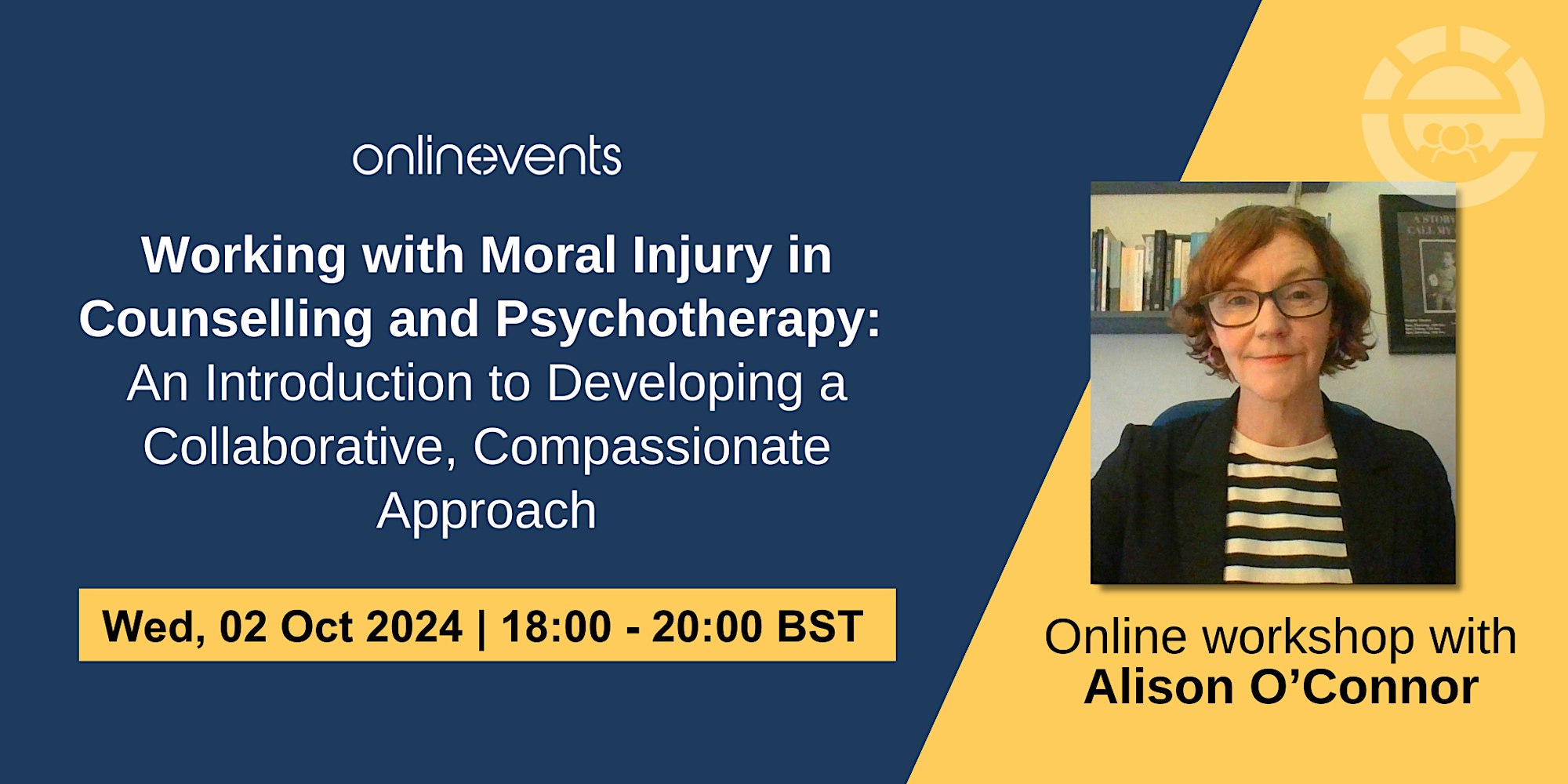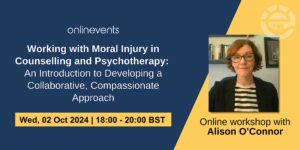About this event
What does the concept of moral injury mean for us as a counselling profession? How might this strengthen our ability to work therapeutically with clients working and living in conditions of systemic injustice? Arguments are emerging for standardised treatment approaches for moral injury. What do we think of this, versus the idea that we may be medicalising a human, moral response to suffering and injustice?
Moral injury is the deep emotional and psychological distress caused by “perpetrating, failing to prevent, bearing witness to or learning about acts that transgress deeply held moral beliefs” (Litz et al, 2009), often exacerbated by a sense of betrayal by someone in authority. Understanding of moral injury evolved in the military context when soldiers were unable to reconcile acts committed with their personal moral codes. The global pandemic increased awareness of its relevance to healthcare staff and all who work on the human frontline. In a recent survey of doctors by the BMA, 78% said the terms moral injury or moral distress resonated with their experiences. Moral injury is being increasingly recognised across multiple professions, including clergy, social work, academia and mental health. Anecdotal examples include not being able to provide care that feels good enough, a sense of betrayal by those in authority due to lack of accountability, staff shortages, and pay freezes. This is a global issue beginning to present in counselling and psychotherapy contexts.
Alison co-founded a social enterprise, Moral Injury Partnership with Sophie Redlin and Simon Edwards, in 2022, based on their respective Churchill Fellowships exploring indigenous talking circles, creative approaches to trauma and moral injury, and post-traumatic growth. As a GP, a military veteran, and a therapist, they share an understanding of moral injury as a human response to situations that challenge our moral values. Not a sign of weakness, lack of resilience or mental disorder, but a reminder that we are human, and when we work in conditions that conflict with our core sense of what is right, it hurts us.
They are delivering a retreat-based programme of restorative support, centred around talking circles, self-compassion and forgiveness, and evaluating this in partnership with the International Centre for Moral Injury at Durham University. This session will share learning from practice and research which will help therapists develop a non-pathologizing, compassionate approach to moral injury and moral repair.
Learning Objective Participants Can Expect From This Event
- This workshop will deepen participants understanding of Moral Injury and how it may present in counselling and psychotherapy contexts.
- Participants will be introduced to the reflective group retreat model, and what initial findings have to offer the counselling and psychotherapy profession.
- Participants will be invited to consider how using moral injury as a framework might stengthen our ability to work holistically and compassionately, helping us to look after ourselves and guard our own moral wellbeing.
Who is This Workshop Appropriate For?
- Counsellors, psychotherapists and all who work in the helping professions.
How May This Workshop Impact Your Practice?
- This workshop will deepen participants understanding of the moral, social and political contexts in which we work and support others.
RECORDING
This workshop will be recorded and you can use the ticket function to pre-purchase the recording before the event. This will be useful for colleagues who are not able to attend the event live and also for those who attend the event live and want to watch it again.
ZOOM
This workshop will be hosted on the Zoom meeting platform where we will use our cameras and microphones to interact with each other as a group.
SELF-SELECT FEE
The self-select fee is a radical inclusion policy to open learning for all colleagues. The guide price for this event is £20.00, however, we appreciate that income varies greatly in different locations and circumstances. Please contribute what you can to help us maintain inclusive professional training.
___________________________
All the colleagues at ONLINEVENTS and the presenters we collaborate with are committed to working in a manner consistent with the BACP Ethical Framework, which can be accessed on the link below. When registering for this event you are agreeing to be present and interact in a manner that is consistent with this Framework.
Alison O’Connor

Alison is a therapist, supervisor and trainer with 25 years experience of groupwork, therapy and applied theatre. She has been privileged to work in prisons, Romanian orphanages, with older adults, military veterans and survivors of complex trauma. She worked for several years as Lecturer and Senior Lecturer in Counselling and Psychotherapy at University of South Wales. She is Co-Founder of Re-Live, an Arts and Health charity, co-creating Life Story Theatre with older adults and survivors of trauma and adversity. Alison and Re-Live Co-Founder, Karin Diamond, received an Arts and Health Practice Award from the Royal Society of Public Health for creative work with military families. They also received an award for International Leadership in Arts and Health from Arts and Health Australia. Karin and Alison have recently written a book, with friend and colleague, Clark Baim, Creating Life Story Theatre: A Guide for Applied Theatre Practitioners, which will be published by Methuen in early 2025.
Alison’s Churchill Fellowship, Transforming Trauma: Moral Injury and the Arts with military veterans, families and communities, opened the door to a creative, compassionate approach to wellbeing which links the personal, the political and the spiritual. She established Moral Injury Partnership with Sophie Redlin and Simon Edwards, two other Churchill fellows. They are delivering a retreat-based programme of restorative support for frontline professionals impacted by moral injury and burnout, which is being evaluated in partnership with the International Centre for Moral Injury at Durham University. Alison has published several articles on moral injury and has presented her work at the BACP Research Conference, the Pluralistic Practice Conference and the International Centre for Moral Injury’s Inaugral International Conference at Durham University.
Alison is committed to enhancing practitioner wellbeing by co-creating restorative, reflective experiences that allow people in the helping professions to be well in the work they do. Teachers, counsellors, nurses, doctors, care workers, police, paramedics, prison staff, all who work at the human frontline. The work hurts at times. Support is vital.
LinkedIn | Alison O’Connor



